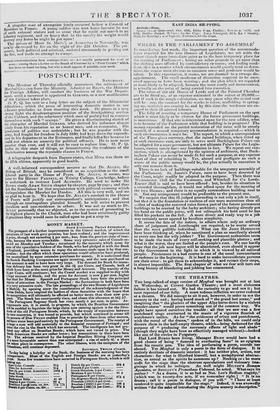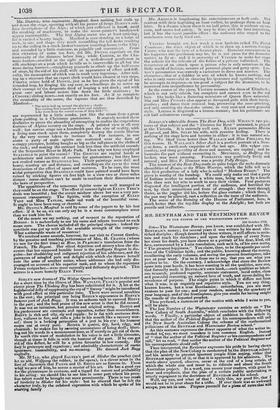THE THEATRES.
THE long-talked-of stage version of Manfred was brought out at last on Wednesday, at Covent Garden Theatre ; and a most elaborate failure it has turned out. We had the curiosity to go and see it ; but soon repented of our folly. A more tedious infliction we never endured at a theatre. We did manage to sit it out, however, in order to see the soenery to the end; having heard much of" the grand last scene," and imagining that" the glaciers of the upper Alps borne down by a violent thunder-storm" would prove something out of the common way. We might have spared ourselves the trouble: all that we saw was a few pasteboard crags overturned to the music of a vigorous flourish of watchmen's rattles. As for "the evidences of crime and punishment, with the moral of the drama," spoken of in the bills, we could only. discern them in the half-empty theatre, which—being darkened for the purpose of " producing the necessary effects of light and shade" (though they might have been as effectively managed without)—looked like one of the circles in Purgatory.
Had Lord BYRON been living, Manager Bum,: would have had a good chance of being " damned to everlasting fame" in an epigram from his caustic pen. The idea of performing a poem, sounds too absurd. Yet Manfred is only a poem in the form of dialogue. It is entirely destitute of dramatic interest : it has neither plot, action, nor characters : for what is Manfred himself, but a metaphysical abstrac- tion, as unreal as the spirits he summons up ? Nothing csa be more unfit for the stage than the abstruse speculations and visionary ima- ginings in which he indulges. As well might MILTON'S Samson Ayonistes, or SHELLEY'S Prometheus Unbound, be acted. What says its author? " Ass drama, it is as bad as Nat. Lee's Bedlam tragedy," [which was in twenty-five acts, if we remember right.] " It is no drama ; call it a poem in dialogue, if you will." " I have at least rendered it quite impossible for the stage." Indeed, it was avowedly written "for the sake of introducing the Alpine *cowry in description." • Mr. IliseiviL, who represents _ lifonfral. does nothing but stalk up tuid down the stage, spouting with all his power of lunge Bs RON'S sub- lime descriptions of the Alps ; of which just sufficient is Ireaerl, amid the creaking of machinery, to make the scene-painter's handywork appear contemptible. The first Alpine scene was at least amu.ing; fur it excited a hearty laugh. Manfred is seen standing on a ledge of rock, in size and shape very much resembling the tall desks reaching up to the ceiling in a stock-broker's narrow counting-house in the City ; and ascended by a little staircase, as palpable and COIIVCIiii lit. From this elevation of some ten feet, did Mr. DENVIL expatiate on the immensity of the distance below him ; while COOPER, as the Cis- mois.hunter—startled at the sight of a well-dressed gentleman in silk stockings on a peak which he tells us is inaccessible to all but the most daring hunters—straightway proceeds to climb up the half-score of steps, by the aid of his stuff, with an appearance of effort and diffi- culty, the assumption of which was in truth very ingenious. After toil- ing up a staircase that an expert clerk would have cleared at two steps, COOPER seizes hold of DENVIL, just as he has given the signal of his intended leap, by flinging his cap over, as schoolboys do to screw up their courage td the desperate deed of leaping a wet ditch ; and with great care and labour assists him down the little staircase ; he Cooesat) sliding down—not exactly on his feet. As if to complete the comicality of the scene, the vapours that are thus described by Manfred-
" The mists boil up around the glaciers ; clouds Rise curling fast beneath me white and sulphury. Like foam from the roused ocean of deep hell I"—
are represented by a little smoke, just like the steam from a great plum-pudding in a Christmas pantomime. It scarcely needed these drolleries to prove the absurdity of attempting to realize the stupendous features of Alpine scenery on the stage. A painted view is all very well : but canvas crags not a hundredth part the size of reality, with a living man stuck upon them, completely destroy the scenic illusion by the very means taken to increase it. For instance, in one scene a party of male spirits are scattered over the face of a craggy precipice, holding boughs as big as the tall pines in the clefts of the rock ; and making the cataract look less than the artificial cascade of the Serpentine River in Hyde Park. Then why not have employed STANFIELD to paint the scenes ? The GRIEVES are capital hands at
architecture and interiors of caverns for pantomimes ; but they have riot studied nature as STANFIELD has. Their paintings were dull and
heavy, wanting air and distance, and crowding on the eye to the total destruction of the effect of space and vastness. To be sure, the most serial perspective that STANEIELn could have painted would have been ruined by sticking figures six feet high in a view two or three miles distant : scene-shifters can't be made to conform their dimensions to the laws of perspective. The apparitions of the numerous Spirits were as well managed as they could be on the stage. The effect of roseate light on ELLEN TREE'S dress was beautiful ; but the scenic rainbow above her was a very per- manent transparency. The Spirits, with the exception of ELLEN TREE and Miss TAYLOR, made sad work of the beautiful verse. It ought to have been sung or chanted.
Mr. DENVIL'S Manfred is said by some of the papers to be his best effort : if it be so, we can only say he is a more commonplace actor than we took him for.
Of the music we say nothing, out of respect to the reputation of BISHOP: it is melancholy to see his name and talents lowered to such mean uses. The chorus included all the principal singers : indeed the spectacle was got up with all the available strength of the company. What a miserable waste of resources!
We received some amends, however, for our visit to Covent Garden, by the genuine and touching performance of Mrs. H. CRAMER (whom we saw for the first time) as Rose, in PLANCHE'S translation from the French, The Regent. Her silent dejection and misery when she dis- covers that her supposed humble lover is the profligate Regent in dis- guise—her shuddering and indignant rejection of his addresses, and the paroxysm of mingled pain and delight with which she throws herself into the arms of another suitor, whose addresses she had only dis- couraged on account of his superior rank, and to whom the repentant Prince resigns her—were most naturally and delicately depicted. This actress is a more homely ELLEN TREE.



























 Previous page
Previous page